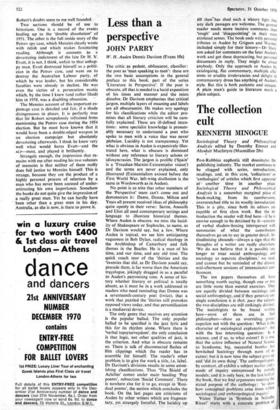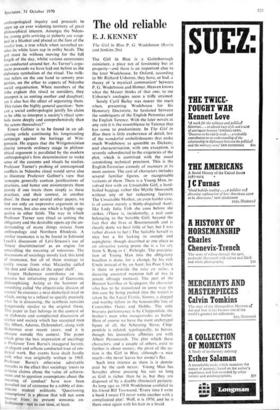The collection
.KENNETII MINOGUE
Sociological Theory and Philosophical Analysis edited by Dorothy Emmet and Alasdair MacIntyre (Macmillan 20s)
Post-Robbins euphoria still dominates the publishing industry. The market continues to be clogged with series, introductions, readings, and, in this case, 'collections' or 'anthologies' of articles which first appeared at another time in another place. Sociological Theory and Philosophical Analysis is a somewhat marginal piece of book-making, from its cumbersome, overstretched title to its woolly introduction. This is a pity, since both its editors are capable of first class work. But the in- troduction the reader will find here—if he is unwise enough to be detained by it—consists of verbal shadow-boxing interspersed with summaries of what the contributors themselves go on to say in greater detail. At- titudinising abounds—always a sign that the thoughts of a writer are really elsewhere. 'We do not believe that it is possible any longer to treat social anthropology and sociology as separate disciplines,' we read, and cannot but be reminded of the drowsy mid-afternoon sessions of international con- ferences. ..
The ten papers themselves all have something worth saying, though one or two are little more than mental exercises. They are equally 'divided between sociology and social anthropology, and if they generate any single conclusion it is that, pace the editors. the two disciplines are still strikingly distinct. The sociologists to be found writing here—most of them are in fact philosophers—show an overriding preoc- cupation not with the question: What is the character of sociological explanation?—but with the less interesting question: Is it science, and if so, to what extent? It is true that the active influence of Natural Science as handsome, big, successful brother has bewitched Sociology through most of its career; but it is now time the subject grew up and 'did its own thing'. The anthropologists by contrast, all exhibit a subject matter and a mode of inquiry unimpressed by outside models; and it is only here, in the last half of the book, that we find arguments meeting the stated purpose of the anthology : `to silo how conceptual problems arise from within sociological and anthropological inquiry'.
Victor Turner in 'Symbols in Ndembo Ritual' starts with a concrete problem of
anthropological inquiry and proceeds to open up an ever widening territory of great philosophical interest. Amongst the Ndem- bu, young girls arriving at puberty are wrap- ped in a blanket and placed at the foot of the ,nudyi tree, a tree which when scratched ex- udes its white latex sap in milky beads. The girl must lie without moving for the full length of the day, whilst various ceremonies are conducted around her. As Turner's argu- ment proceeds we have laid out before us the elaborate symbolism of the ritual. The milk- tree refers on the one hand to sensory pro- perties, rties on the other to aspects of Ndembu social organisation. When members of the tribe explain this ritual to outsiders, they interpret it as uniting mother and daughter; yet it also has the effect of separating them. This raises the highly general question : 'how can a social anthropologist justify his claim to be able to interpret a society's ritual sym- bols more deeply and comprehensively than the actors themselves?'
Ernest Gellner is to be found in an ad- joining article continuing his longstanding campaign against the heritage of Witt- genstein. He argues that the Wittgensteinian charity towards ordinary usage in philoso- phical argument is paralleled by the modern anthropologist's firm determination to make sense of the customs and rituals he studies. Professor Turner's probing of unrecognised conflicts in Ndembu ritual would serve also to illustrate Professor Gellner's view that `concepts generally contain justifications of practices, and hence one misinterprets them grossly if one treats them simply as these practices, and their context, in another dress'. In these and several other papers, we find not only an impressive argument in its own terms, but also one which is highly sug- gestive in other fields. The way in which Professor Turner sees ritual as uniting the obligatory and the desirable opens up the un- derstanding of many things remote from anthropology and Northern Rhodesia. A similar resonance is to be found in Edmund Leach's discussion of Levi-Strauss's use of 'binary discrimination' as an engine for unravelling the meaning of totemism. The discussions of sociology mostly lack this kind of resonance, but all of them. manage to justify rescue from what Macaulay called the dust and silence of the upper shelf'.
Jurgen Habermas contributes an im- pressive but infuriating piece of Germanic philosophising. Acting as the hammer of something called 'the objectivistic illusion of science' he executes a neat dialectical triad in which, owing to a refusal to specify precisely what he is discussing, the synthesis remains dangerously similar to the original thesis. This paper in fact belongs in the context of an elaborate and complicated discussion of science and society which has occupied men like Albert, Adorno, Dahrendorf, along with Habermas over recent years; and it is obscure outside this context. The paper which gives the best impression of sociology is Professor Tom Burns's inaugural lecture, an elegant and urbane conducted tour of em- pirical work. But events have dealt hardly With what was originally written in 1965. Professor Burns's otherwise admirable remarks to the effect that sociology 'exists to criticise claims about the value of achieve- ment and to question assumptions about the meaning of conduct' have now been parodied out of existence by a rabble of doc- trinaire student militants. 'Questioning assumptions' is a phrase that will not soon recover from its present semantic en- feeblement—not in our time, at least.











































 Previous page
Previous page